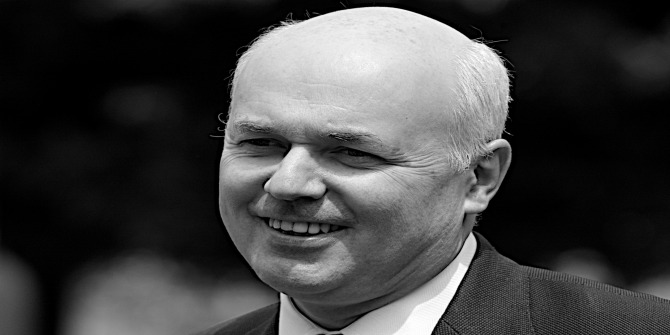 UKIP received 12.6 per cent of the vote, but only one seat in the UK’s general election. In an interview with EUROPP’s editor Stuart Brown, Alan Sked, the founder and former leader of UKIP, discusses his views on the party’s campaign and his thoughts on the upcoming referendum on the UK’s EU membership.
UKIP received 12.6 per cent of the vote, but only one seat in the UK’s general election. In an interview with EUROPP’s editor Stuart Brown, Alan Sked, the founder and former leader of UKIP, discusses his views on the party’s campaign and his thoughts on the upcoming referendum on the UK’s EU membership.
UKIP ended up winning one seat in the general election. What did you think of the party’s campaign?
I think UKIP’s campaign was dreadful. Some of the comments by UKIP candidates were beyond belief: like the one who said he was going to put a bullet between the eyes of his rival and called him all sorts of nasty things. Then there was another one who had to apologise to a female journalist for saying things I couldn’t possibly repeat. No other party has candidates like this. They seem to be scraping the bottom of the barrel – and then there’s Farage, who’s fairly near the bottom of the barrel himself.
It’s quite ironic because Farage and UKIP obviously thought that this was the election in which they were going to break through: where they would dominate the media and reshape British politics. And everything that UKIP wanted to happen actually happened for Sturgeon and the SNP. In the TV debate Farage was reduced to simply complaining about the state of the BBC’s audience while Sturgeon was running away with it. I’m not one to celebrate the success of the SNP, but I really did it find it quite amusing the way Sturgeon managed to steal Farage’s thunder.
Following the election Nigel Farage resigned as leader of the party, although he later changed his mind. Where does this leave UKIP going forward?
I think they’re heading for a shipwreck. If Farage doesn’t come back then there isn’t anyone else to take over. The previous leader, Lord Pearson of Rannoch, was a disaster.
We now have the prospect of a referendum on the UK’s membership of the EU. How do you see the referendum going?
I think it’s fine, but they’ll try and stitch it up by getting a meaningless piece of paper where the EU will say that the UK is no longer committed to ‘ever closer union’ – which we aren’t committed to in any case because we’re outside of the Eurozone. Then they’ll also reach some agreement saying that the UK doesn’t have to give benefits to citizens from other EU countries, but again that’s going to happen anyway.
David Cameron hopes that if he dresses this kind of agreement up as something meaningful it will be enough, but I think it will just split the Conservative Party. People in the city might support him, but a lot of the press won’t. He’ll try and repeat what happened in the referendum in 1975, but I don’t think people will fall for it this time.
There are an awful lot of people in the Conservative Party who have no time for Cameron. The Eurosceptic wing of the party have no time for him, and even the pro-Europeans in the party don’t understand him because nobody believes he has any principles – and he doesn’t. So I think there would be a damaging split in the party. Some people dispute that and say that we’ve had threats of a split in the Tories before without it happening, but that’s not necessarily true – they did after all split over the Corn Laws in 1846 and it took them 30 years to recover.
Note: This interview was originally published on our sister site, the LSE’s EUROPP blog, and gives the views of the author, and not the position of the British Politics and Policy blog, nor of the London School of Economics. Please read our comments policy before posting. Featured image credit: Gage Skidmore CC BY-SA 2.0
 Alan Sked is Professor of International History at LSE. He founded the United Kingdom Independence Party and was the party’s leader until 1997.
Alan Sked is Professor of International History at LSE. He founded the United Kingdom Independence Party and was the party’s leader until 1997.








On the referendum: the problem, as Scotland has shown, is that one side can have the numbers but the other all the passion. You get to a point where the winners lose and the losers win. Can this be good for representative democracy?